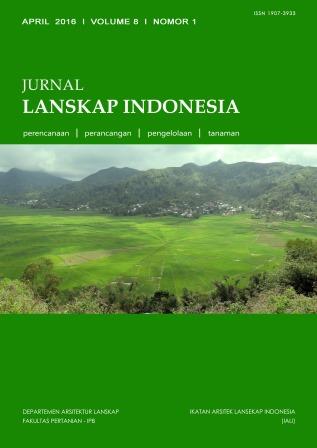PERENCANAAN LANSKAP WISATA SEJARAH UNTUK MENUNJANG ADAPTIVE REUSE GEDUNG JUANG 45 BEKASI JAWA BARAT
Abstract
Gedung Juang 45 Bekasi (GJ45B) is a historical site as a legacy from the colonial period, located in Bekasi District, West Java Province. The site has been neglected due to unsuitable site utilization and lack of concern from the local government with respect to preserve the area. The objectives of this study are: (1) to identify the historical value and landscape character of GJ45B, (2) to analyze the potential and constraints of the site to be developed as a historical tourism site, and (3) to develop a concept and site plan for historical tourism of GJ45B site through spatial, circulation, activity, and facility programs which support historical interpretation of the site. The study was conducted through a planning process consisted of preparation, inventory, analysis, concept, synthesis, and site planning. The analysis applied descriptive and spatial approach by using scoring and weighting to physical, historical, and tourism aspects and subsequently resulted three suitability zones for historical tourism development with high, medium, and low values. The conceptual plan for the site is that GJ45B is designed for an educational and recreational historical tourism site by developing historical interpretation of Bekasi District and particularly of GJ45B. The final output of the study is a site plan including spatial, circulation, activities and facilities plans.Downloads
This journal permits and encourages authors to post items submitted to the journal on personal websites or institutional repositories both prior to and after publication, while providing bibliographic details that credit, if applicable, its publication in this journal. However, after the article is submitted and published in this journal, it is fully copyrighted by the Jurnal Lanskap Indonesia or JLI. If excerpts from other copyrighted works are included, the author must obtain written permission from the copyright owner and give credit to the source in the article. Then, the writer or reader is allowed to copy, share, and redistribute articles/material in any form. But it must still include the appropriate source and credit because the article in this journal is licensed by Creative Commons Attribution 4.0 International License (CC BY 4.0).
I. Proposed Policy for Journals That Offer Open Access
Authors who publish with this journal agree to the following terms:
- Authors retain copyright and grant the journal right of first publication with the work simultaneously licensed under a Creative Commons Attribution License that allows others to share the work with an acknowledgement of the work's authorship and initial publication in this journal.
- Authors are able to enter into separate, additional contractual arrangements for the non-exclusive distribution of the journal's published version of the work (e.g., post it to an institutional repository or publish it in a book), with an acknowledgement of its initial publication in this journal.
- Authors are permitted and encouraged to post their work online (e.g., in institutional repositories or on their website) prior to and during the submission process, as it can lead to productive exchanges, as well as earlier and greater citation of published work (See The Effect of Open Access).
II. Proposed Policy for Journals That Offer Delayed Open Access
Authors who publish with this journal agree to the following terms:
- Authors retain copyright and grant the journal right of first publication, with the work after publication simultaneously licensed under a Creative Commons Attribution License that allows others to share the work with an acknowledgement of the work's authorship and initial publication in this journal.
- Authors are able to enter into separate, additional contractual arrangements for the non-exclusive distribution of the journal's published version of the work (e.g., post it to an institutional repository or publish it in a book), with an acknowledgement of its initial publication in this journal.
- Authors are permitted and encouraged to post their work online (e.g., in institutional repositories or on their website) prior to and during the submission process, as it can lead to productive exchanges, as well as earlier and greater citation of published work (See The Effect of Open Access).



























